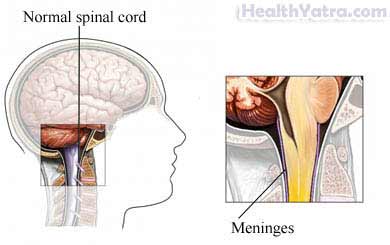Viral Meningitis Treatment Cost in India
The brain and spinal cord are surrounded by layers of tissue. These layers are called the meninges. When these layers becomes swollen and irritated it is called meningitis. The swelling in these layers can put pressure on the brain and spinal cord. The most common forms of meningitis include:
- Viral meningitis
- Aseptic meningitis —caused by a variety of medical conditions except bacteria
- Bacterial meningitis —generally the most serious infection

Causes
Viral meningitis is caused by a virus such as:
- Enteroviruses
- Herpes viruses
- Mumps
- Varicella virus ( chickenpox)
- Measles
- Rubella viruses
- West Nile virus
Viruses can be spread in numerous ways including:
- Contact with fluids from cough or sneeze of an infected person
- Contact with feces from infected person
- Close personal contact with someone who is sick
- Through insect bites
Risk Factors
Factors that increase your risk of viral meningitis include:
- Conditions that weaken the immune system, such as HIV infection
- Immunosuppressive treatments
- Crowded, unsanitary conditions
- Season: summer and early fall
Symptoms
Symptoms of viral meningitis include:
- High fever
- Headache
- Stiff, sore neck
- Nausea
- Vomiting
- Sensitivity to bright lights
- Sleepiness
Symptoms in newborns and infants include:
- Inactivity
- High fever (especially unexplained high fever)
- Irritability
- Vomiting
- Feeding poorly or refusing to eat
- Tautness or bulging of soft spots between skull bones
- Difficulty awakening
Diagnosis
The doctor will ask about your symptoms and medical history. A physical exam will be done. The doctor will focus on the nervous system. To help rule out other causes of the inflammation, such as a tumor, your doctor may need pictures of the brain, spine, and skull. These pictures can be created with:
- MRI scan
- CT scan
Viral meningitis has similar symptoms as bacterial meningitis. To make sure you do not have bacterial meningitis, the following tests may be done:
- Lumbar puncture (spinal tap) —to look for bacteria in spinal fluid
- Tests of blood, urine, mucus, and/or pus from skin infections to look for bacteria
Treatment
Treatment includes:
- Rest and fluids
- Nonsteroidal anti-inflammatory drugs
- Aspirin
- Note: Aspirin is not recommended for children with a current or recent viral infection Check with your doctor before giving a child aspirin
- Antibiotics—may be given for 2-3 days while the doctor wait for test results about bacterial infection, antibiotics are note effective for viral infection
- IV antiviral drugs—for severe infections
If you are diagnosed with viral meningitis, follow your doctor’s instructions .
Prevention
You can not control where a virus goes once it is in your body. However, you can take steps to prevent viral infections:
- Wash your hands often. This is even more important:
- If you are in close contact with an infected person
- Immediately after changing the diaper of an infected infant
- Regularly wash objects and surfaces touched by children. Use a diluted bleach solution.
- Ask your doctor about appropriate vaccinations. Especially important if you’ve never had measles, mumps, rubella, and chickenpox.
- To prevent infections spread by mosquito bites:
- Follow public health recommendations for reducing mosquitoes near your home.
- Take steps to avoid being bitten by mosquitoes. Use insect repellant and appropriate clothing when outdoors.
- Avoid areas or being outside when mosquitoes are prevalent.
- If you are contemplating a pregnancy:
- Be sure you are protected from common diseases like chickenpox. Ask your doctor about recommended vaccinations.
- Avoid all contact with rodents during pregnancy.
